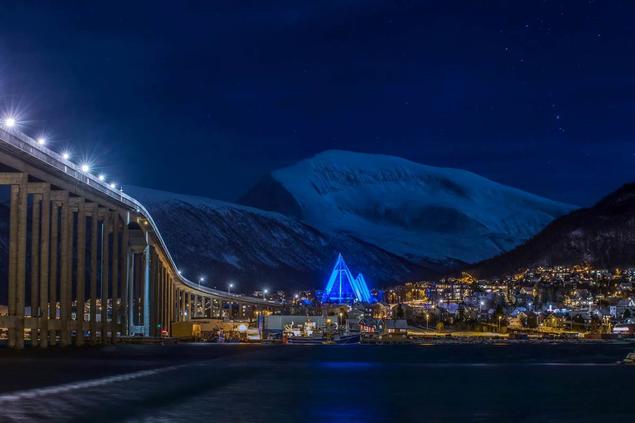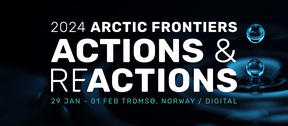Meet FNI at the Arctic Frontiers conference in Tromsø

Arctic Frontiers is an international conference focusing on Arctic issues that takes place in Tromsø, Norway, from 29 January to 1 February 2024. The conference hosts participants from academia, politics, government, and business. With this year's theme, “Actions & Reactions”, the Fridtjof Nansen Institute (FNI) is set to play a key role in various side events, bringing our expertise to the forefront of Arctic discussions.
Arctic Frontiers aims to showcase Norwegian interests and leadership in the Arctic while setting the agenda for key topics in the North, ranging from geopolitics to economic development and climate.
“The Fridtjof Nansen Institute (FNI) plays a pivotal role in both Norwegian and international discussions about the Arctic”, says FNI senior researcher Andreas Østhagen. Decades of investment in Northern area research have established Norwegian researchers, particularly FNI's 10-15 Arctic experts, as world leading.
“At conferences like Arctic Frontiers, we engage with colleagues from prestigious institutions such as Harvard and Oxford, and from Beijing and Delhi, to ensure our knowledge of the region remains at the forefront”, Østhagen says.
Geopolitical tension and Arctic cooperation
FNI researchers will engage in dialogues about the Arctic Council's challenges amid geopolitical shifts and the Ukraine war. We will also organize an informal ‘pubinar’ featuring the Norwegian foreign minister Espen Barth Eide.
FNI's involvement extends to analyzing Nordic cooperation within the changing Arctic landscape, with a focus on political, economic, and defence perspectives, and an assessment of the impact of the High Seas Treaty on Arctic Governance, delving into issues of environmental and regional management. Another session will explore global influences in the Arctic and the responses of Arctic states, highlighting outside interests and potential unified strategies. Additionally, the institute will contribute to the understanding of developments inside Russia against the backdrop of the war in Ukraine by presenting insights on the current situation in North-West Russia. FNI senior researcher Andreas Raspotnik is again the host on stage during the entire conference.
Monday, 29 January, 11:00 - 12:30
Humans and Technology in the Arctic
Location: Driv Bar
Organizers: YATA Tromsø with Arctic Frontiers
Climate Security Talk with FNI's Serafima Andreeva and UiT's Gunhild Hoogensen Gjørv.
Monday, 29 January, 13:30 - 15:00
Arctic Science in the Time of Crises
Location: The Edge: Room Arbeidskontoret 1 & 2
Organizer: Fridtjof Nansen Institute
Speakers:
• Keynote: Oran Young, Professor Emeritus, University of California
• Svein Vigeland Rottem, Senior Researcher, Fridtjof Nansen Institute
• Serafima Andreeva, Researcher, Fridtjof Nansen Institute
• Rolf Rødven, Executive Secretary, Arctic Monitoring and Assessment Programme (AMAP)
• Camilla Brekke, Director, Norwegian Polar Institute
• Sofie Løchen Smedsrud, Norwegian Research Council
• Evan Bloom, Senior Fellow at the Woodrow Wilson International Center for Scholars in Washington
Moderator:
• Malgorzata Smieszek-Rice, Researcher, UiT the Arctic University of Norway
Since 1996 the Arctic Council (AC) has been the key forum for Arctic issues. This panel will address the Ukraine war's effect on the AC's scientific role and broader Arctic international scientific collaboration. Discussions will cover the AC’s work on climate, pollutants like black carbon, methane, mercury, their international dimensions, and the impact of the recent pause in cooperation with Russia on Arctic science and on the AC’s credibility. The session will open with expert insights followed by an audience Q&A.
Watch the recording on Arctic Frontiers' YouTube channel.
---
Monday, 29 January, 13:30 - 15:00
Can the High Seas Treaty Cure Arctic Governance?
Location: The Edge: Room Importkompaniet
Organizer: University of Tromsø Norwegian Centre for the Law of the Sea (NCLOS)
Speakers:
• Vito De Lucia, Professor, UiT
• Gunnar Sander, Senior Researcher, NIVA
• Christian Prip, Senior Researcher, FNI
• Mario Acquarone, Deputy Secretary, AMAP
This session examines the impact of the newly adopted High Seas Treaty for Arctic Governance, with a focus on the Central Arctic Ocean (CAO). It will explore the treaty's potential in establishing marine protected areas, setting environmental impact assessment rules, and reshaping the CAO's governance framework. Discussions will centre on how the treaty might align human activities in the Arctic Ocean with an ecosystem-based approach, highlighting the treaty's role in area-based management, environmental impact assessments, and interactions with other relevant institutions and regimes.
---
Monday, 29 January, 17:30 - 19:00
The Future of Nordic Cooperation: International, Regional and Local
Location: The Edge: Room Arbeidskontoret 1 & 2
Organizers: Fridtjof Nansen Institute, Troms County and Tromsø Municipality
The Nordic region is changing. Cooperation between the five Nordic states, as well as between Nordic regions and communities, is driven by climatic, political, economic and security concerns. This is especially prominent in the Arctic. However, the Nordics are not always a coherent bloc and the potential for cooperation is not the same as exploiting that potential.
This side event will explore how Nordic actors at both the national and the local level view, and engage with, political, economic, and defence cooperation, and what these trends mean for Arctic (geo)politics and governance. We will also look at initiatives taken at the local and regional level linked to the national priorities of Nordic cooperation. Finally, we will speculate about the future of Nordic cooperation.
Programme:
I. International cooperation
• Rune Andersen, Chief, Norwegian Armed Forces Joint Headquarters
• Maria Varteressian, Deputy Minister, Norwegian Ministry of Foreign Affairs
• Patti Bruns, Secretary-General, Arctic Mayors Forum
• Karen Ellemann, Secretary General of the Nordic Council of Ministers
Chair:
• Andreas Østhagen, Fridtjof Nansen Institute and Nord University
II. Regional and local cooperation
• Kristina Torbergsen, Chair of the County Council, Troms County
• Gunnar Wilhelmsen, Mayor of Tromsø
• Mika Riipi, County Governor of the Regional Council of Lapland
• Glenn Berggård, Vice Chair of the Executive Committee, Norrbotten
Chair:
• Kirsti Methi, Tromsø Municipality
Watch the recording on Arctic Frontiers' YouTube channel.
---
Tuesday, 30 January, 09:00 - 10:30
Russia – Keeping Abreast of Developments
Location: The Edge: Room Arbeidskontoret 2
Organizers: UiT The Arctic University of Norway and Fridtjof Nansen Institute
Speakers:
• Geir Hønneland, Research Professor, Fridtjof Nansen Institute
• Arild Moe, Research Professor, Fridtjof Nansen Institute
• Kari Aga Myklebost, Professor, UiT The Arctic University of Norway
• Georgii Chentemirov, Barents Observer
Moderator:
• Thomas Nielsen, Barents Observer
Considering Russia's diminished presence in Western Arctic-oriented conferences since February 2022, this side event presents current developments in North-West Russia, emphasizing their significance for Norway.
The discussion will delve into the status and future of Norwegian-Russian fisheries cooperation in the Barents Sea, a crucial matter for both nations, and examine Murmansk's evolving role in the Russian LNG industry, while considering the potential effects of sanctions on Russian LNG.
Additionally, we will address the profound social, economic, and political changes in North-West Russia due to the war, focusing on cities like Arkhangelsk, Petrozavodsk, and Murmansk. Insights into the local impacts of the war, shifting economic dynamics, and the current perception of Norway in these regions will be a key part of the discussion.
Watch the recording on Arctic Frontiers' YouTube channel.
---
Tuesday, 30 January, 11:00 - 12:30
Launch of the EU's new Arctic Urban and Regional Cooperation Programme
Location: The Edge: Room Importkompaniet
Organizer: European Commission – Service for Foreign Policy Instruments
Featuring:
• Andreas Raspotnik, Senior Researcher, The Fridtjof Nansen Institute
• Clara Ganslandt, EU Special Envoy to the Arctic, EEAS
• Irène Mingasson, Head of Unit, European Commission
• Miguel Roncero, DG MARE, European Commission
• Patti Bruns, Secretary General, Arctic Mayors' Forum
• Carina Sammeli, Mayor of Luleå
• Rebecca Alty, Mayor of Yellowknife, Canada
This session introduces the EU-funded Arctic Urban and Regional Cooperation (AURC) programme. The programme promotes collaboration among Arctic local and regional authorities, communities, and organizations, aligning with broader EU-Arctic initiatives and the Arctic Mayors’ Forum. It is a new initiative enabling 15 Local Authorities from EU and Non-EU Arctic countries to engage in peer-to-peer learning on sustainable urban and regional development.
Speakers will discuss the challenges of sustainable urban development and the benefits of structured cooperation in addressing these issues.
---
Tuesday, 30 January, 17:30 - 19:00
A Global Arctic: Navigating the New Reality?
Location: The Edge: Room Arbeidskontoret 2
Organizers: Nord University. Co-host: Fridtjof Nansen Institute
After decades of a peaceful co-existence among the Arctic 8, the world’s troubles are increasingly affecting the Arctic. Climate change happens faster in the Arctic than other places. Non- Arctic actors are looking North. Rivalry originating elsewhere is seeping into the Arctic.
The first wave of global Arctic interest culminated in 2013 with China, India, Italy, Japan Singapore, and South Korea gaining observer status to the Arctic Council. In 2019, US Secretary of State Pompeo criticised Russia and China at the Arctic Council meeting in Kiruna, signifying that the US-Chinese rivalry was being extended into the Arctic. Russia’s invasion of Ukraine in 2022 put the Arctic Council in jeopardy, impelling Finland and Sweden to seek NATO membership. Russia’s 2023 suggested BRICS research station at Svalbard opens up for more non-Arctic countries to increase their presence.
This event will discuss how outside interests are playing out in the Arctic, who the non-Arctic actors are, and how the Arctic 8 should respond to these new realities. Is a unified response even possible?
Speakers:
• Acquino Vimal, Ambassador of India to Norway
• Dr. Dominik Mutter, Director for Security Policy at the German Ministry of Foreign Affairs
• Marie-Anne Coninsx, Former Diplomat and Senior Associate Fellow, Egmont Institute
• Gørild Heggelund, Research professor, Fridtjof Nansen Institute
• Andreas Raspotnik, Senior Researcher, Nord University
• Bård Ludvig Thorheim, Member of Norwegian Parliament, Høyre
Moderator:
• Iselin Stensdal, Senior Researcher, Fridtjof Nansen Institute
Watch the recording on Arctic Frontiers' YouTube channel.
---
Tuesday, 30 January, 19:00 – 20:30
Arctic Geopolitics Pubinar
Location: Direksjonen, Mack Brygghus, Storgata 4, Tromsø
Organizers: Fridtjof Nansen Institute and UiT the Arctic University of Norway
A pub-talk with leading Arctic figures about current geopolitical challenges in the North, and how to solve them.
We will have a look at the issues facing Arctic states when managing increased tension with Russia, and interest from non-Arctic actors. Moreover, we will discuss how increased cooperation between Arctic countries can alleviate pressures.
Speakers:
· Espen Barth Eide, Minister of Foreign Affairs, Norway
· Stéphane Dion, Special Envoy to the EU and former foreign minister, Canada
· Karen Ellemann, Secretary General of the Nordic Council of Ministers
Conversation led by:
· Mike Sfraga, Chair, US Arctic Research Commission & Chair, Polar Institute, Wilson Center
Responsible:
· Andreas Østhagen, Senior Researcher, Fridtjof Nansen Institute and Nord University
Open to the public, limited space
Location: Mack Brygghus, Direksjonen, Tromsø
Organizers: Fridtjof Nansen Institute & UiT: The Arctic University of Norway
---
Wednesday, 31 January 16:00 - 17:30
The Arctic Council in an Era of Geopolitical Uncertainty: The Mohn Prize
The Edge: Room Arbeidskontoret 2
Featuring:
• Keynote Speaker: Oran Young, Professor Emeritus, University of California
• Hans Kristian Hernes, UiT
• Svein Vigeland Rottem, FNI
Since February 2022, the Arctic Council's future has faced intense scrutiny, especially regarding its role in scientific and environmental policies amid rapid climate change. The notion of Arctic exceptionalism, proclaiming the region’s separation from global security concerns, is challenged by strained Russia-West relations and NATO's expansion into the Arctic. This shift brings resource competition and access to the Arctic Ocean into global focus, redefining Arctic geopolitics. A special panel at Arctic Frontiers will address these changes, coinciding with the award of the 2024 Mohn Prize to Professor Oran Young.
Keynote talks and discussions by experts in Arctic politics, law, and security will also highlight the newly-formed Geopolitics Network in Norway, which aims to foster vital dialogue on the region's geopolitical future.
Watch the recording on Arctic Frontiers' YouTube channel.
---
Thursday 1 February 09:30 - 13.00
The Mohn Prize Seminar 2024: Still the Age of the Arctic?
In this seminar to honour the Mohn Prize laureate Prof. Oran Young, and to and discuss topics within his research and contributions to society, FNI's Olav Scram Stokke is among the speakers, talking about Arctic Environmental Governance: Resilience to Geopolitical Change.

